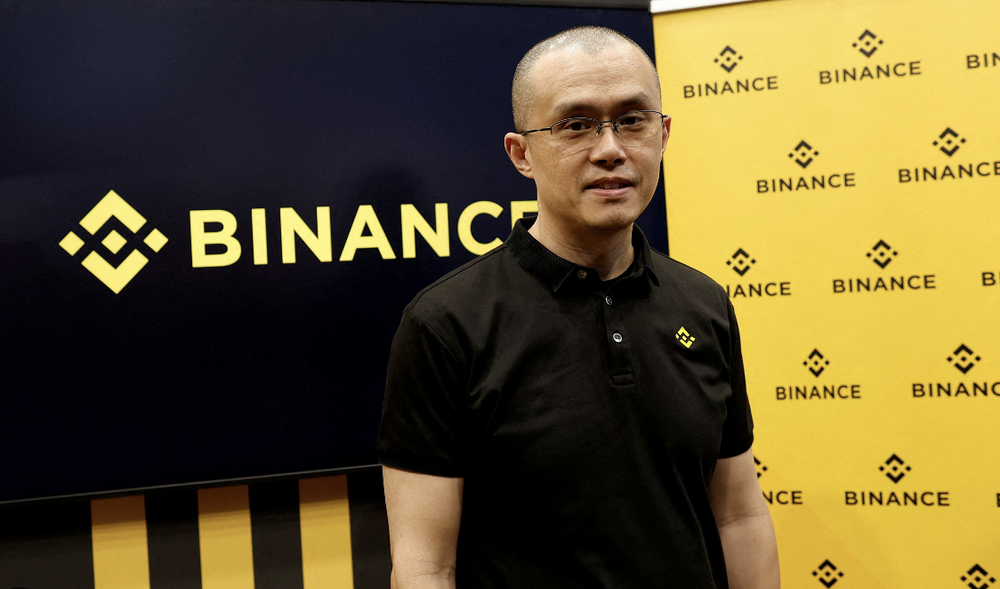The global watershed of blockchain policy in October: China ushered in strong support, and the United States strengthened tax regulation against Libra
Text: Mutual chain pulse · Golden car
Source: Interchain Pulse
In October 2019, countries' policies on blockchain may become a watershed in the development of global blockchains.
On the Chinese side, on October 18th, the second batch of blockchain information service filing list of China Netcom office cloth; on October 25th, the Political Bureau of the CPC Central Committee recently conducted the 18th collective on the status quo and trend of blockchain technology development. Study; on October 26, the "Password Law of the People's Republic of China" voted.
- Security Monthly | 10 security incidents occurred in October, DeFi lending platform into a new choice for hacker money laundering
- Joseph Lubin: Ethereum 2.0 will eliminate professional hardware that wastes resources and significantly reduce user barriers
- Bank of Korea official: China's central bank digital currency helps the internationalization of the renminbi
Under the impetus of the local government, the policies to promote the development of blockchain have been released one after another, and Yunnan and Guangdong provinces are faster.
China's neighboring countries, such as South Korea, also accelerated the pace of blockchain development in October. After China announced that the blockchain is an important breakthrough for independent innovation of core technologies, South Korea has added blockchain-related investments.
On the other hand, the United States is still focusing on cryptocurrency taxation and Libra regulation.
Domestic blockchain support policy in October: reaching the peak number in the second half of the year
Mutual chain pulse According to public information statistics, in October, there were 3 pieces of information related to the blockchain supervision policy in China, and more importantly, one week after the official release of the second batch of filing lists of the website (October 25) It is reported that the application for blockchain service filing enterprises will be subject to on-site verification by the public security network supervision department, focusing on the six major contents of infrastructure construction, management nodes and supervision nodes of the enterprises involved in the blockchain service.
In addition, two regulatory information including the Hong Kong Securities Regulatory Commission issued pre-examination terms and conditions for the supervision of licensed companies investing in virtual assets in early October; subsequently, on October 17, the China Insurance Regulatory Commission issued issues on preventing illegal fund-raising. Risk warning.
In terms of domestic blockchain support, the chain pulse has observed that, as of now, the number of blockchain support policies has ushered in the peak of the second half of the year, with a total of 12, compared with 7 in September. Explain that the policy environment has recovered significantly.
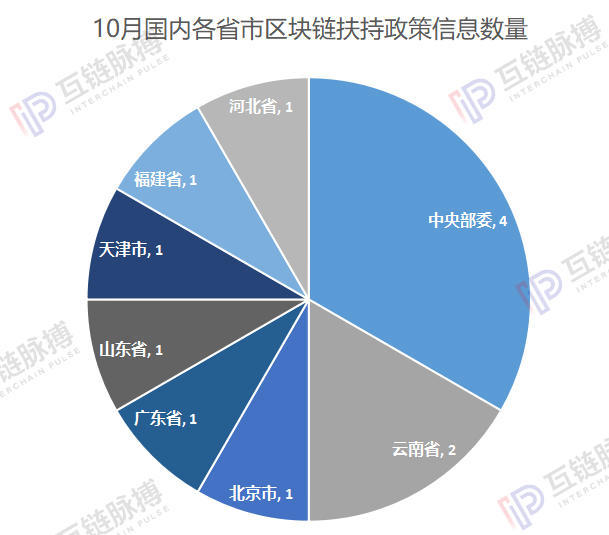
(Cartography: Mutual Chain Pulse Institute Data Source: Public Information)
Among them, the most important thing is that Xinhua News Agency reported on October 25 that the top level clearly stated that the blockchain is an important breakthrough for independent innovation of core technologies. On the second day after the announcement of the news (October 26th), the cryptography was passed.
Just a few days before the launch of these two heavy information, the central government also announced two other support policy information.
During the Sixth World Internet Conference (October 20th), the National Development and Reform Commission and the Central Network Office jointly held a kick-off meeting for Sichuan Province, Hebei Province (Xiong'an New District), Zhejiang Province, Fujian Province, and Guangdong Province. Chongqing National Digital Economy Innovation and Development Pilot Area; On October 21, the State Council issued the "Guiding Opinions of the State Council on Strengthening and Regulating Post-event Supervision", pointing out that relying on blockchain and other new technologies to promote regulatory innovation.
In addition, the inter-chain pulse is concerned that after the central development of the blockchain, the fastest response is Yunnan Province, Guangdong Province and Beijing Municipality.
On October 28, the Kunming Municipal Bureau of Industry and Information Technology of Yunnan Province issued “Several Policies to Support the Development of the Digital Economy (Trial)” (Draft for Comment). The document pointed out that Kunming supports enterprises to carry out demonstration projects such as blockchains and other typical projects around smart cities and future communities. The maximum subsidy of 10 million yuan to carry out the demonstration application of blockchain and other scenes; on October 29, Luo Yingguang, secretary of the Yuxi Municipal Party Committee of Yunnan Province, and Zhang Dehua, Mayor of Yuxi, Yunnan Province, delivered a speech and said that Yuxi City will focus on supporting blockchain and digital economy industry. development of.
In addition, Huangpu District of Guangzhou City also officially issued the implementation rules of the Huangpu Blockchain Policy 2.0 on the first Monday (October 28). The detailed rules indicate that it is encouraged to set up a blockchain industrial fund with a scale of 1 billion yuan; each year, two enterprises or institutions that carry out blockchain public chain and alliance chain construction projects will be selected, and the highest subsidy for the blockchain public chain construction project will be 10 million yuan. The blockchain alliance chain construction project has a maximum subsidy of 3 million yuan.
Beijing Zhongguancun also publicized a list of support for research and development expenses for small and micro enterprises in science and technology on October 28, including Axi Chain, Chain Technology, Ford Tree, Eurochain Technology, Chain Fangda, Node Consensus, and Fusion Chain technology, magic chain technology, chain cloud wisdom, digital chain technology and many other blockchain enterprises.
Before the high-level tuning blockchain field, Tianjin, Fujian, Hebei, and Qingdao also had blockchain-related policy information announced this month.
On October 18th, Shibei District of Qingdao City set up the “Measures for the Development of Blockchain Industry in Shibei District of Qingdao Municipal Science and Technology Bureau (Trial)” and “Special Fund for Blockchain of Shibei District of Qingdao City North District Science and Technology Bureau” The two methods of the Administrative Measures (Trial), like the documents of Kunming City of Yunnan Province and Huangpu District of Guangzhou City of Guangdong Province, refer to the blockchain-related subsidies.
It is reported that the two documents will be used to regulate the development of blockchain technology and industry in Shibei District, and promote the healthy development of blockchain technology and related services in Shibei District. It is pointed out in the document that subsidies will be subsidized on various aspects such as blockchain activities, platforms, sites, finance, talents and renting.
In addition, on October 9th, Tianjin issued the China (Tianjin) Pilot Free Trade Zone Innovation and Development Action Plan to accelerate the research and application of the blockchain and other fields, and build a blockchain innovation research institute.
On October 10, the Fuzhou area of the Fujian Pilot Free Trade Zone issued a policy. The document pointed out that the banking financial institutions supporting the free trade zone should carry out pilot business in combination with blockchain and financial services.
On October 13, the Standing Committee of the Hebei Provincial Party Committee held a meeting. The meeting pointed out that it is necessary to actively guide the deep integration of the digital economy and the real economy, and strive to build the digital Hebei and the digital Xiong'an.
Foreign blockchain supervision: Libra is still the focus of US, UK and France supervision
According to the incomplete statistics of the inter-chain pulse, in October, there were 21 information related to the blockchain regulatory policies in foreign countries, up 61.53% from 13 in the previous month. Among them, the largest number of regulatory policy information is the United States, a total of seven, mainly around the cryptocurrency tax.
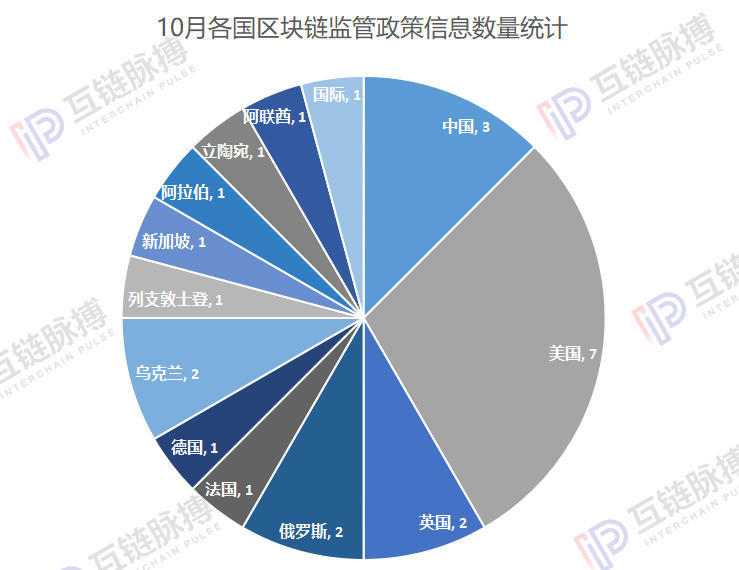
(Cartography: Mutual Chain Pulse Institute Data Source: Public Information)
On October 2, the US government in Ohio announced a moratorium on supporting companies to use Bitcoin to pay taxes. The reason is that, according to an internal review, the approval of the US Depository Board is required before the launch of a website in Ohio that allows companies to pay in digital currency;
On October 9, the US Internal Revenue Service issued the first five-year guide to calculate the tax payable on cryptocurrencies. The new guide states that when new cryptocurrencies are recorded on the blockchain, taxpayers should be counted as tax liabilities if they actually have control over the tokens and can use them.
On October 12, the US Internal Revenue Service issued a new draft 1040 form on additional income and income adjustments, and for the first time asked taxpayers about their encryption activities;
On October 27, the source confirmed that the US Internal Revenue Service will audit the cryptocurrency activities and increase the review and investigation of cryptocurrency investors.
While regulating cryptocurrency taxation, the United States has not relaxed its focus on Libra.
On October 5, the United States, Britain and Australia jointly issued an open letter to Facebook requesting Facebook to stop the end-to-end encryption program.
Subsequently, the Bank of England also launched a new regulation on encrypted payment on October 9. The Bank of England's Financial Policy Committee said in a statement that Facebook's Libra and other new digital payment service providers must meet these rules in order to operate in the UK. These rules require that their operations and financial status be displayed throughout the payment chain and that the regulators provide adequate information for monitoring payments.
At the same time, in the week before Zuckerberg’s attendance at the hearing (October 16th), France also proposed regulation of cryptocurrencies. The Deputy Governor of the Bank of France called for the establishment of a global regulatory framework for cryptographic assets.
In addition, the interlinkage pulse is concerned that Ukraine released two policy information related to blockchain regulation in October.
On October 7th, the Ukrainian government proposed to establish a cryptocurrency tax rule and plan to legalize mining within two to three years. Subsequently, on October 22, Ukraine had drafted two cryptocurrency bills.
Liechtenstein and Lithuania also published more important regulatory policy information in October.
On October 6, the Liechtenstein Parliament unanimously passed a “blockchain bill”. The bill aims to strengthen investor protection, combat money laundering and establish transparency. The parliament statement stated that the bill would make Liechtenstein the first country to fully supervise the token economy. The Lithuanian central bank issued the STO guidelines on October 23, becoming the first market regulator to issue the STO guidelines.
Foreign blockchain support: South Korea accelerates blockchain development Canada considers central bank digital currency
In October, there were 11 foreign blockchain support policy information, which was a certain increase compared with last month. Among them, South Korea is the most supportive policy, and South Korea is also the country that responded most promptly to China's “1025 blockchain new wind”.
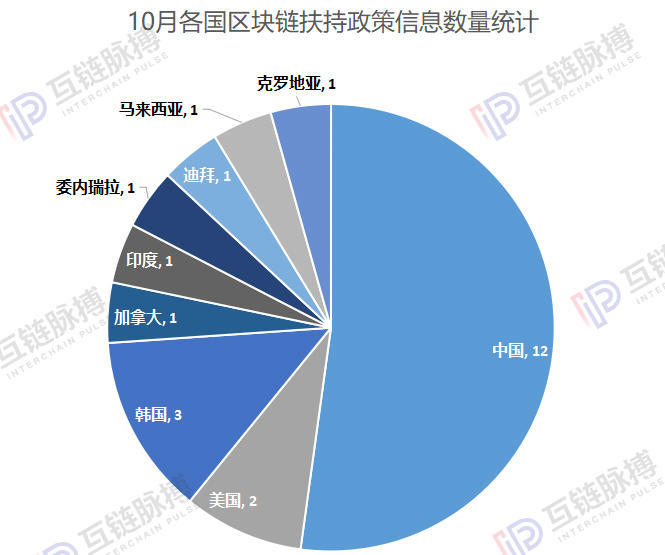
(Cartography: Mutual Chain Pulse Institute Data Source: Public Information)
After China announced its focus on blockchain technology, South Korea has also added investment.
On October 29th, the Ministry of Science and Information and Communication Technology confirmed that the government will invest about $12.8 million in blockchain projects by 2020. At the same time, the Department outlined a range of spending plans that would help to promote blockchain programs in the public and private sectors and hope to train a new generation of blockchain experts.
Prior to this, on October 17, the Deputy Mayor of Busan City, South Korea, disclosed the road map for the Free Zone of the blockchain supervision in Busan. President Wen Zaiyi also said that Busan’s blockchain supervision and free zone is expected to drive the development of the blockchain industry.
On October 25, the 4th Industrial Revolutionary Committee, directly under the President of South Korea, urged the government to institutionalize cryptocurrencies and formulate relevant taxation schemes as soon as possible. He also said that the government should be aware of the inevitable trend of the blockchain and determine the legal status of the cryptocurrency based on the blockchain as soon as possible.
On the other hand, following the promotion of central bank digital currency and national digital currency research and development in France, Thailand, Saudi Arabia and the United Arab Emirates in September, Canada and Venezuela also began to promote the development of national digital currency this month.
On October 15, the Governor of the Bank of Canada said that the Bank of Canada is considering launching a digital currency to help it defend against the “direct threat” of cryptocurrency. The central bank's digital currency will initially coexist with coins and banknotes, and will eventually replace coins and banknotes altogether.
On October 23, the Venezuelan President approved the trade of petroleum coins against French currency. At the same time, the Venezuelan president also urged businesses and business owners to consider adopting cryptocurrency payment solutions to revitalize the country's economy.
In addition, India, Dubai, Croatia, and Malaysia have further planned the development of blockchain this month.
On October 10, the Croatian government decided at the cabinet meeting to approve the signing of the Declaration on the Establishment of a Partnership for European Blockchain. On the 21st, Dubai plans to become a blockchain-driven city by 2020; on the 31st, Tamil India Nadbang is developing state-level policies for blockchain and AI.
On October 11th, Malaysia’s 2020 budget mentioned cryptocurrency, or cryptocurrency for the first time a major country’s budget. At the same time, the document pointed out that although well-known companies in key industries have taken the lead in adopting digital currency in their daily work, the days of widespread adoption are still far away.
This is also the overall status quo of the current development of blockchain. Although there is still a long way to go from widespread application, various fields have been actively responding to the call for development. Especially after China's clear blockchain development strategy, the international blockchain competition has officially started.
Mutual chain pulse statistics of blockchain policy in October 2019:
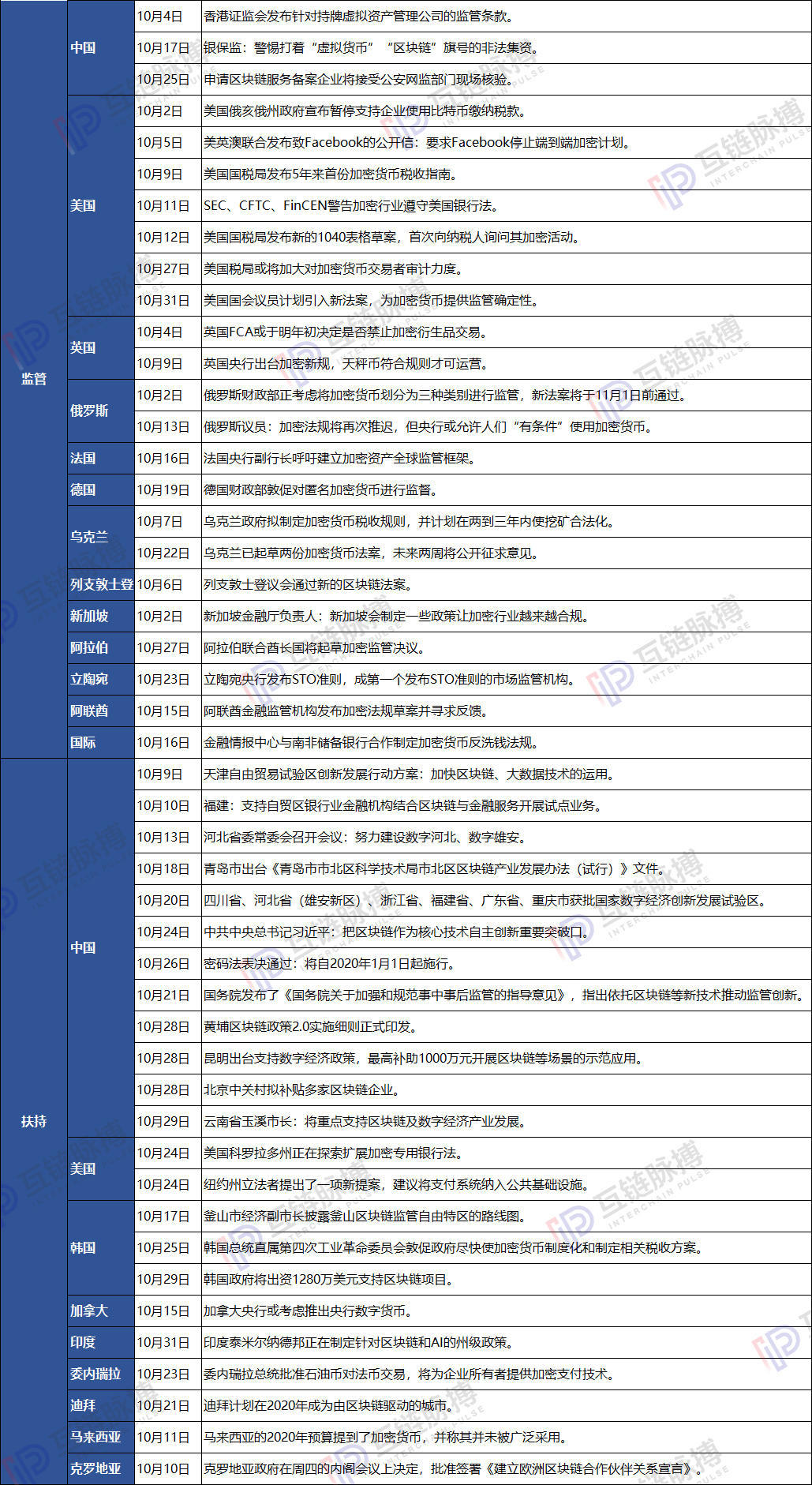
This article is [inter-chain pulse] original, reproduced please indicate the source!
We will continue to update Blocking; if you have any questions or suggestions, please contact us!
Was this article helpful?
93 out of 132 found this helpful
Related articles
- Chen Chun talks about blockchain: the key application space is that industrial manufacturing cannot use this name to stir up coins
- Degree Universe, Netease Planet, Love Diamond… Can the blockchain projects of these big factories take the opportunity to respawn?
- Deng Jianpeng: Blockchain supervision legislation, may wish to "chain the chain"
- BTC repeatedly shocks the dish, try to avoid frequent operations
- Tsinghua Financial Review Courier: blockchain or new boost in China's financial corner overtaking
- Comment: The exchange is open finance
- Tether issued a stable 24-hour trading volume of anchored offshore RMB, only 0.1BTC

